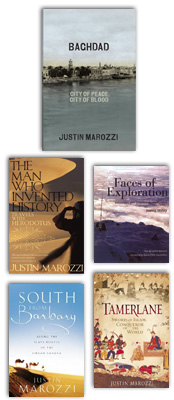Little America: The War within the War for Afghanistan
By Rajiv Chandrasekaran
Bloomsbury, £16.99
One of the books that best encapsulated the delusional folly of the Iraq War was Rajiv Chandrasekaran’s Imperial Life in the Emerald City, an excoriating story of ideological arrogance and ignorance on a grand scale. This was American reportage at its most penetrating, a darkly comical account of hubris meeting with nemesis on the banks of the Tigris, graveyard of the neocon dream.
In Little America Chandrasekaran turns his unrelenting focus to Afghanistan, a country that has been the graveyard of so many empires for so many centuries one wonders why any political or military leader should think this time it’ll be different, no matter how many soldiers and gender advisors they deploy, irrespective of how many schools and medical clinics they build. If any foreign invader had the right approach to Afghanistan, it was surely the Turkic warlord Tamerlane, who swept through in 1398, rode across the snow-capped Hindu Kush in an astonishing march, banged heads together and then left immediately after a characteristic slash-and-burn campaign. He was right not to linger.
Obama’s 2009 surge was supposed to put everything right in a mission neglected after the Iraq War distracted Washington’s attention. Yet once again good American intentions foundered in the Helmand River Valley, where a previous generation of optimistic Americans had tried unsuccessfully to transform Afghan society with over-ambitious irrigation schemes in the Fifties and Sixties. To the horror of Afghan’s conservatives, women started throwing off the veil in what came to be known as “Little America”. Modernisers squared up against the mullahs in a conflict only put on hold with the arrival of the Russians in another ill-fated intervention of 1979.
Chief among Chandrasekaran’s culprits for this latest flop is the US military. Garlanded after his achievements in Iraq, General Petraeus was allowed to fight a counter-insurgency campaign on steroids, in tandem with an unrealistic nation-building programme, rather than concentrate on the narrower objective of smashing Al Qaeda and helping Afghans end the conflict. Internal rivalries bedevilled the mission from the start, exemplified by the clash between US ambassador Karl Eikenberry and General Stan McChrystal, a personal reflection of the age-old animosity between State Department and Department of Defence.
The military regarded the diplomats as lily-livered prima donnas who rarely ventured beyond the blast walls of the embassy and its “Duck and Cover” bar, squandering $340m a month of American taxpayers money in frequently corrupt USAID schemes that delivered little lasting benefit on the ground. The diplomats in turn considered the military crude, hard-charging grunts whose aggressive extension of military operations into new districts simply exacerbated the insurgency. The author notes the extraordinary occasion on which American forces arrived in a village so remote that the villagers spoke to them in Russian, unaware that the Soviets had left Afghanistan.
British readers will be particularly interested in the “Allies at War” chapter, in which Chandrasekaran charts the disintegration of relations between the British and Americans in Helmand. The Americans considered British restraint appeasement, the British thought the Americans far too gung-ho about dealing with the “bad guys”. Had the two allies communicated more effectively with each other and demonstrated a greater willingness to learn from the best aspects of the other’s counter-insurgency strategy, “The result almost certainly would have been fewer body bags draped with the Union Jack or the Stars and Stripes”.
The enduring truth about Afghans is that they will fight any foreign invader tooth and nail until that army leaves and then, when the last Russian, American or British tank and helicopter is gone, spurred on by deeply venal and malevolent neighbours, they will fight each other. Little America should be required reading for anyone with an interest in foreign interventions, especially western politicians, soldiers and diplomats, if only to relieve them of the dangerous idea that we are any good at them. There is no arguing with Chandrasekaran’s pithy conclusion: “For years, we dwelled on the limitations of the Afghans. We should have focused on ours.”
Mail on Sunday, 29 July 2012
[ Read more… ]

